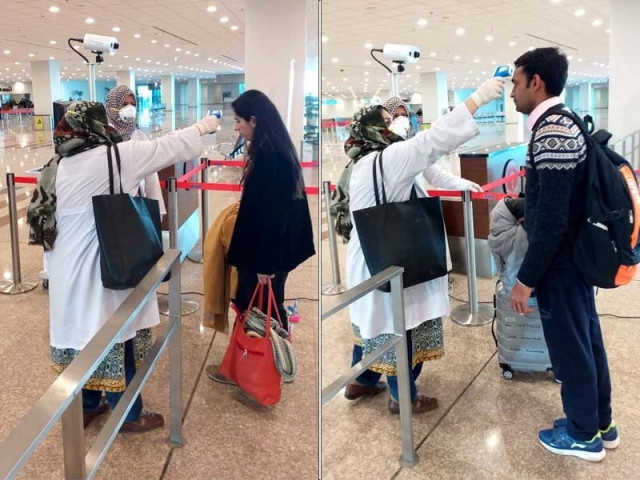Repatriation of Pakistani expats
Govt needs a health security strategy for migrants which encompasses safeguarding the overall health of emigrants

Travellers must provide information on flu, cold, cough, and sore throat. PHOTO: EXPRESS/FILE
Pakistan’s manpower is an extremely valuable asset, especially given that over 60% of its population comprises young people. Inadequate employment prospects and familial responsibilities have already pushed the majority of the youth to seek better economic opportunities abroad. Official statistics show that there are almost 4.7 million recorded Pakistanis working in the Middle East.
As a result of Covid-19, most emigrants have been dismissed and forced into isolation in overcrowded, unsanitary environments with no means of revenue. Travel limitations have rendered them immobile. The crisis has placed an unprecedented strain on Pakistan’s fiscal position, causing the State Bank to amend GDP growth from an earlier estimate of 3.5% to 3%. For Pakistan, remittances make up about 86% of the secondary income balance of the economy. Nearly 60% of these are from Gulf countries.
Despite financial and manpower constraints, Pakistani missions abroad are supporting expatriates in every possible way. Government departments such as the National Command and Operation Center (NCOC), the Aviation ministry, the Foreign Office and Overseas Pakistani Foundation (OPF) are closely coordinating with each other. A Crisis Management Cell within the FO has been set up in this regard. In order to ensure smooth return of Pakistanis stuck abroad, stepwise repatriation is being carried out.
Additionally, the Bureau of Emigration and Overseas Employment (BEOE) is coordinating with the National Vocational and Technical Training Commission to get skills certified and if need be, upgraded so that repats can have better employment in the future, abroad and locally. Meanwhile, OPF is also working to help recover residual dues of the workers from their foreign employers. OPF chains of schools are also offering 50% tuition waiver to children of returning families as well as procuring grants for training, microloans and setting up micro enterprises for repatriated workers.
However, socio-economic impacts of returning emigrants must be considered. Since, most returning workers do not have much savings as they send back money on a monthly basis, the immediate effects of the fall in remittances are already visible. Foreign remittances have already halved in the past two months and are anticipated to decrease by $1 to $1.5 billion per year if the situation persists (approximately 10,000-11,000 households will be directly affected.)
The present oil glut and discontinuation of all tourist projects in the Gulf countries means a cessation of manpower export for now. The IMF has already estimated the unemployment rate projection for Pakistan to be 6.2% for 2020. Before the pandemic, around 60,000 people were in the process of applying abroad for jobs. Unemployment has a high correlation with a country’s crime rate, illiteracy rate and domestic violence. Moreover, a huge influx of unemployed workers causes anxiety and even in some cases resentment, from within existing circles and those coming in. Hence, re-integration of these workers into society is crucial.
The government needs to develop a health security strategy for migrants which encompasses safeguarding the overall health of emigrants upon their return to Pakistan as well as investment and labour market reintegration supported by a secure financial legal environment. Cottage industries should be encouraged since these make up for 80% of employment in Pakistan. However, it is an ignored sector of the economy. Scaling up construction projects in Pakistan and absorbing returnee manpower in the ongoing CPEC projects are viable options which should be explored. Even though Covid-19, has halted major projects in the Gulf, once activities resume, there will be a demand for a labour force. Apart from focusing on making the labour force more competitive, the government should ensure a plan for mitigating the worst threats to migrant workers’ rights and improving their status throughout the Gulf.
Published in The Express Tribune, June 13th, 2020.
Like Opinion & Editorial on Facebook, follow @ETOpEd on Twitter to receive all updates on all our daily pieces.














COMMENTS
Comments are moderated and generally will be posted if they are on-topic and not abusive.
For more information, please see our Comments FAQ